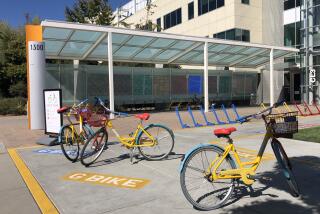Work and School Make No Cents
- Share via
You can spot them anywhere on a high school campus. They drive their own cars to school, wear expensive clothes and regularly buy their food off campus. They are also the first to fall asleep during class discussions, last to turn in homework (if at all), and always the ones the loudest protesters when I ask my class to do any kind of substantive work outside of class. Who are these superficial underachievers? They’re a growing number of students who work while in school, the worst investment any young mind can make, either financially or academically.
Some of my students work for legitimate reasons. They support their families, pay rent or buy food because there isn’t enough to go around. Most, however, work because the enticing whispers of capitalism lure them into making the quick buck. They hear the sirens of materialism and pick up minimum-wage jobs because they want to drive a car down the boulevard or wear designer sneakers. These students think that making $600 to $700 a month is “real money.” They do nothing to invest in their moral or academic education, which, ironically, will come back to haunt them in their wallet that presently bulge with “Benjamins.”
When I ask these working students to read more than five pages a night or write for more than half an hour, they balk at my demand and resort to tired excuse of “But you don’t understand. I have to work!”
Maybe I don’t understand. But I do know this: Working 20 hours to 30 hours a week to support a student’s “expenses” instead of studying during that time makes absolutely no sense.
Flipping burgers instead of studying is fiscally insane. But my burger-flipping students fail to see the road ahead for themselves--that ignoring schoolwork for a low-wage job now will very likely ensure that you keep that job or one like it for the next 20 to 30 years.
These students are not academically stupid or lacking basic skills; they’re just misguided by the superficial enticements they feel the need to pursue. In doing so, they also ignore the big picture in their lives, that investment in education should be their first and highest priority. Workplaces like McDonald’s, Taco Bell and other retail chains that rely on student workers could invest in our youth by offering a 15/15 workweek instead of the usual 30 hours they do now. Students could be paid for 30 hours of work with half of that time being required to do school work. The improvement in reading, writing and computational skills for their future work force would be well worth the investment.
When schools and communities pluck the same strings of my oft-heard chord of “School is your job! You don’t need another one,” then maybe our working students will realize that fiscal and academic knowledge, and not their short-term monetary windfall, is where their real capital lies.
More to Read
Inside the business of entertainment
The Wide Shot brings you news, analysis and insights on everything from streaming wars to production — and what it all means for the future.
You may occasionally receive promotional content from the Los Angeles Times.










